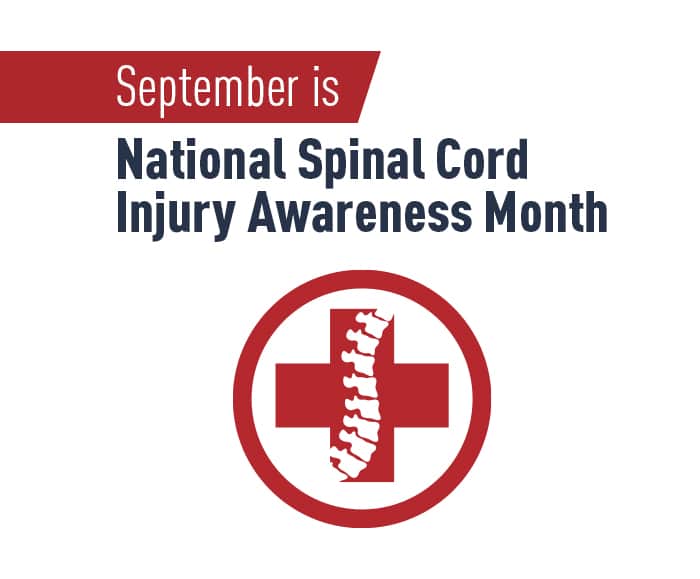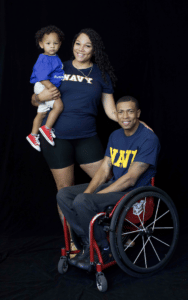Interview with Angela Weir, RN, Director of Medical Services for Spinal Cord Injury Awareness Month
Posted By PVA Admin on September 14, 2023
Did you know that September is National Spinal Cord Injury Awareness Month? We spoke with Angela Weir, RN CCRN and Director of Medical Services at PVA, to share how PVA helps Veterans with spinal cord injuries and diseases like MS and ALS; and VA medical centers across the country, as well as what people can do to support Veterans with SCI/D.
Q: How does PVA advocate for improved healthcare access and support services for Veterans with spinal cord injuries?
AW: PVA has many departments that advocate for healthcare access and support services. However, our Medical Services Department has a unique niche among Veteran Service Organizations.
We are the only Congressionally Charted Veteran Service Organization with a presence at every VA SCI/D Center and are authorized to conduct site visits at these centers. We collaborate with the healthcare professionals who support SCI/D patients to ensure the quality and timeliness of care.
We also collaborate with other departments within PVA, like the Architecture Department, to ensure that centers are physically accessible to Veterans with SCI/D. We collaborate with government relations by taking a 30,000-foot view of the whole SCI/D system of care and looking for prevalent needs across the system.
We also develop relationships with the medical center chiefs, physicians, nursing staff, social workers, psychologists, and everybody who participates in the care across the system, as well as with leadership at the facilities.
Lastly, we partner with organizations that share the same goal, like the Christopher Reeve Foundation and other ALS or MS organizations.
Q: How does PVA work with VA hospitals, and why is a quality VA healthcare system necessary for PVA members?
AW: PVA works hand-in-hand with our national service officers and visits every site. We are there for two to four days and meet with every discipline that provides care to veterans with SCI/D, including ALS and MS.
During these visits, we conduct surveys to share recommendations with VA leadership. We offer solutions and share best practices among these centers.
We also develop reports and submit them to the Secretary of the VA, the SCI/D Program Office in the VA, and the Office of the Inspector General, as well as to our PVA leadership and the Chapter Office associated with that site. Each report includes our recommendations, and about 90% are resolved when we return the following year or are completed.
We have a critical role in the SCI/D system of care by identifying how each Center can elevate their care. We try to identify their most significant challenges and best practices, and share these solutions between all SCI/D Centers.
The VA provides so many services that people in the private sector do not have access to.
What makes the VA SCI/D care so unique is the access to caregiver support, payment methods, benefits, clothing allowances, and medications. The medications in the private sector are very expensive, and Veterans receive access to top-notch disease-modifying medications at no cost or very little cost to them.
ALS veterans receive immediate full benefit coverage in every aspect of their care. They become 100% service-connected immediately, and everything is expedited so that we can anticipate their needs as their disease progresses and really put everything in place to support them as they progress through their disease.
Q: What are the most pressing issues that individuals and Veterans with spinal cord injuries still face, and what steps is PVA taking to address these challenges?
AW: One of the most pressing issues individuals with SCI/D face are shortages in healthcare staff, support for caregivers combating isolation, and mental health support.
One of the most pressing issues individuals with SCI face is staffing shortages in hospitals across all of health care. The VA is looking for ways to attract healthcare professionals to the VA. But then, within that, they have to work to attract healthcare professionals who specialize in SCI/D, which is really labor and emotionally intensive. It is a very unique and specialized type of nursing care and health care.
Support for caregivers is a huge problem. We want to make sure that the people providing care in the homes of Veterans with SCI/D are receiving compensation and support. They need respite time, where they can go and be themselves and also take care of their own health needs.
Lastly, throughout the pandemic, social isolation became an issue, along with the mental health challenges associated with it. Those who were in long-term care were even more isolated than the rest of the population. Because of this isolation, we’ve seen an increased need to focus on mental health and the challenges associated with isolation.
Q: How can individuals, communities, and policymakers actively participate in supporting PVA’s efforts during National Spinal Cord Injury Awareness Month and beyond?
AW: We want to hear from you. Reach out to your congressman and local officials to share your experiences. Most importantly, reach out to PVA and connect with your local chapter.
The most important thing to do for a Veteran with SCI/D is to listen to their story. Understand their challenges. Recognize that their challenges are very different than those of an able-bodied person, whether it’s in receiving the care they need, accessing their community, or even getting a job. PVA has many ways to address these needs.

